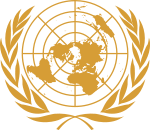- Military Staff Committee
-
The Military Staff Committee (MSC) is the United Nations Security Council subsidiary body whose role, as defined by the United Nations Charter, is to plan UN military operations[1] and assist in the regulation of armaments.[2]
The greatest purpose of the MSC, arising from Article 45 of the UN Charter, was intended to be providing command staff for a set of air-force contingents.[1] These contingents, provided by the Permanent 5 members (P5) of the Security Council (the People's Republic of China, France, Russia, the United Kingdom, and the United States) to be held at ready for the discretionary use of the United Nations.
Contents
History
Establishment of the MSC
Though the Military Staff Committee is referred to in the Charter prior to its formal establishment, including in Article 26 and earlier Articles in Chapter 7, it is actually established by Article 47, which defines the membership of the Committee as "the Chiefs of Staff of the permanent members of the Security Council or their representatives".[1] It is also referred to in the first United Nations Security Council resolution. The MSC is the only subsidiary body of the Security Council named in the Charter, and by far the longest-standing subsidiary council of the UN. The MSC remains active in the UN as a cadre of military advisors to their government's diplomats and peacekeeping.
"Failure" and Dormancy of the MSC
As the Cold War began in the wake of World War II many of the then intended functions of the UN were degraded or set aside, as evidenced by the rarity of binding actions taken during that period[citation needed]. States became paralyzed in taking concrete actions for peace, as they were increasingly concerned about controlling their "spheres of influence". Containment of Communism became the focus of the USA, while Europe was locked into a stalement with an "iron curtain" closing off East from West.[3] One of the other results of this period was that no member nation ever made the promised forces ready[citation needed], despite their commitment to do so in the charter.[1] Consequently, both Article 45 and the MSC are often considered to be a "dormant" part of the United Nations structure[citation needed].
Organisation of the MSC
The MSC consists of army, naval and air force representatives from the P5 who meet every 14 days at the headquarters building of the UN in New York. Additional United Nation members are included in meetings regarding peacekeeping operations in which their country's forces are deployed.
The Current MSC Representatives
As of July 2007[update] the current MSC Representatives are:[4]
- People's Republic of China: Major General Liu Pei
- France: Brigadier General Dominique Trinquand
- Russian Federation: Lieutenant General Nikolai M. Ivanov, Russian Federation Armed Forces
- United Kingdom: Major General Peter Gilchrist, British Army
- United States: Lieutenant General John F. Sattler, United States Marine Corps
Chairmanship of the MSC
The chairmanship of the MSC rotates in alphabetical order (by country name) at the beginning of each month through the representatives of the P5 members.
A dormant body
Though its role is to plan UN military operations, in practice this power was nipped in the bud shortly after the development of the UN due to the tensions of the Cold War and the subsequent lack of cooperation between the NATO and Warsaw Pact nations. The MSC has therefore had very limited activity in the past 50 years of its existence. The Military Staff Committee was therefore perhaps accurately described by British naval historian, Dr. Eric Grove, as "a sterile monument to the faded hopes of the founders of the UN".[5] Proposals for reviving the Military Staff Committee have been presented,[6][7] often in relation to the larger issue of UN reform.
References
- ^ a b c d Charter Of The United Nations: Chapter VII
- ^ Charter Of The United Nations: Chapter V
- ^ Jean E. Krasno, "To End the Scourge of War: The Story of UN Peacekeeping." in Jean E. Krasno, ed.,The United Nations: Confronting the Challenges of a Global Society (Boulder, CO: Lynne Rienner, 2004), pp. 242
- ^ Permanent Missions to the United Nations, Nº 297 (United Nations, New York, July 2007), pp. 356-7
- ^ GROVE E., “U.N. Armed Forces and the Military Staff Committee: A Look Back” International Security, XVII, n° 4 (1993) pp. 172-182
- ^ UN peacekeeping: the mirror should be polished | Contemporary Review | Find Articles at BNET.com
- ^ http://www.un.int/russia/new/MainRoot/Statements/ga/ga_docs/Statement070227.htm>
External links
- http://www.gmu.edu/academic/pcs/moller.htm
- http://www.globalpolicy.org/security/peacekpg/reform/2001/msc.htm
- http://pksoi.army.mil/PKM/publications/perspective/perspectivereview.cfm?perspectiveID=5
United Nations Charter Text 
History Organs
createdSecurity Council · General Assembly · Economic and Social Council · Trusteeship Council · International Court of Justice (Statute) · Secretariat · Military Staff CommitteeComplete text · UN Portal Categories:- Staff (military)
- United Nations Security Council subsidiary organs
Wikimedia Foundation. 2010.
